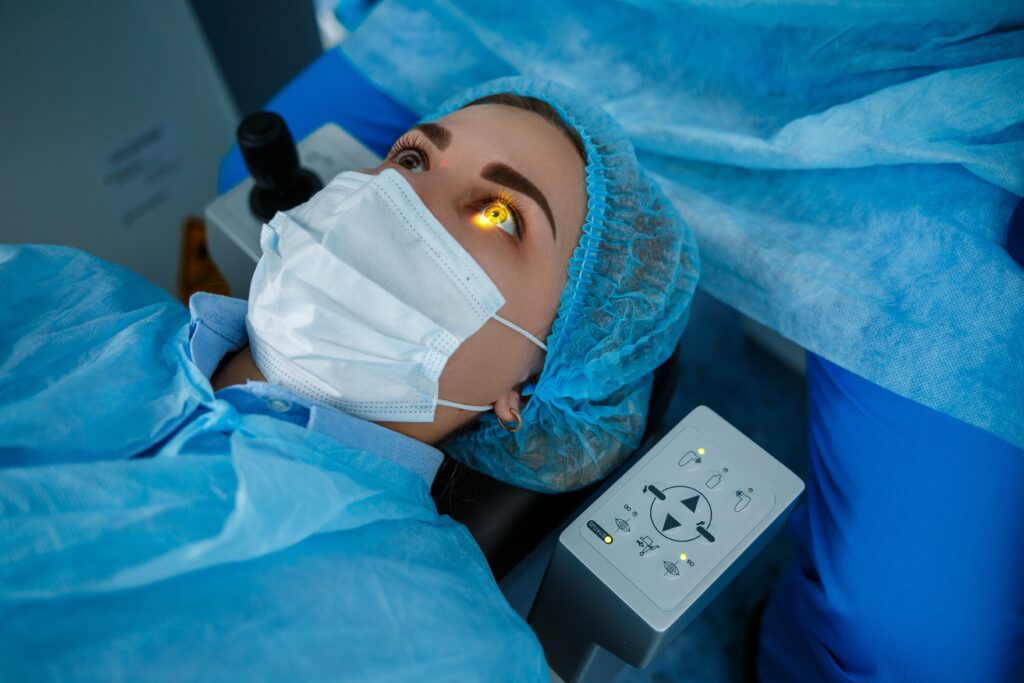LASIK

LASIK
LASIK is an excellent option for permanent vision correction that can allow you to significantly reduce your dependence on visual aids. At Palmer Eye Center, our LASIK surgeons are dedicated to helping you achieve your goal of visual freedom.
What is LASIK?
Laser-assisted in situ keratomileusis, or LASIK, is an outpatient procedure that uses a laser to reshape the eye’s cornea, which is the clear window in the front of the eye, to correct refractive errors. Refractive errors are problems with the way the eye focuses light, which causes nearsightedness, farsightedness, or astigmatism.
LASIK can allow you to experience greater visual freedom and reduced dependency on visual aids like glasses and contact lenses. At Palmer Eye Center, our LASIK surgeons have the experience and expertise necessary to give you excellent results from LASIK.
How Does LASIK Work?
To understand how LASIK works, it is important to first understand the cornea. The cornea is the clear, round dome-shaped window at the outer part of your eye.
The cornea is the part of the eye that is altered during LASIK surgery to correct your refractive error. Those who do not have a refractive error, and experience vision that is sharp without the need for visual aids, have a cornea that refracts light so that it lands directly on the retina with the help of the eye’s lens. When light moves through the eye, it first goes through the cornea, then through the eye’s lens, and then onto the retina for image processing to the brain. Refractive errors occur when the light does not land directly on the retina.
This is often due to an irregular shape of the cornea or an eye that is too short or too long. LASIK is a highly effective procedure for correcting a refractive error by changing the shape of the cornea so that the light can land directly on the retina. Before you can schedule the LASIK procedure, you will need to qualify as a candidate. Proper preoperative evaluations are critical to the success of this procedure for you.
What Happens During LASIK?

Before the procedure, your LASIK surgeon will apply anesthetic eye drops to numb your eye. Next, a suction ring is applied to the cornea, designed to hold the eye steady and confirm the eye’s pressure.
Then, your LASIK surgeon will create a thin flap on the surface of your cornea. To treat the inner layers of the cornea, your LASIK surgeon will lift the corneal flap and apply the excimer laser to the exposed interior surface of the cornea to reshape the tissue.
The computer-controlled excimer laser removes the tissue under the flap and reshapes the cornea. In less than sixty seconds, high-energy pulses from the excimer laser reshape the internal cornea. The flap is then repositioned over the treated area. The corneal flap serves as a natural bandage, which eliminates the discomfort associated with other types of refractive surgery, and expedites the healing process.
After the flap is repositioned, the surgery is complete. Your LASIK surgeon will apply eye drops to assist with the healing process. You will be required to take eye drops regularly during your recovery to prevent possible complications like an infection.
What is Monovision LASIK?
The natural lens inside your eye changes shape as you focus on objects near and far. When you look close up, your lens becomes thicker, and the lens becomes thinner when you gaze into the distance.
This system works well until the age of forty or shortly after that. At that time, your lens gradually loses its ability to focus, which is called accommodation, resulting in blurred vision for near objects. You begin to need reading glasses for up-close work and may switch to bifocals so you can see both near and far with one set of glasses. Monovision has been used for years among contact lens wearers and is readily adaptable for people choosing Laser Vision Correction. With this system, your dominant eye is corrected for distance, and the non-dominant eye is slightly under or over corrected, depending on whether you are nearsighted or farsighted, which means its primary focus is close for vision.
Both eyes are still working all the time, but your brain soon learns which image to select. This system can reduce or eliminate the need for reading glasses for those over forty.
Monovision will reduce your need for glasses by giving you usable vision at near and far distances after age forty when most people become increasingly dependent on reading glasses or bifocals for up-close work. However, monovision does not mean you will never need glasses again.
You may still need glasses occasionally for certain activities, such as driving at night and reading the fine print. At Palmer Eye Center, we offer monovision to people over forty years of age or more like a flexible, practical answer to reduce your dependency on corrective lenses.
How Do I Know If I Am A Candidate for LASIK?
Not everyone is a candidate for the LASIK procedure. Determining your candidacy is the crucial step to your path to better vision and will ensure that the procedure is as successful as possible. Before LASIK is performed, you will be required to undergo a series of diagnostic tests to determine the stability of your vision. After a thorough evaluation of your cornea, the doctors will be able to determine if you are a candidate.
To qualify as a candidate for LASIK, you must:
If you are a candidate, the chances of success will be excellent. If you are not a candidate, your eye doctor will explain the reasons and potentially suggest a different vision correction procedure that better suits your eyes.
Are You A Good Candidate for LASIK?
Take our LASIK Self-Test and find out!
Are There Alternatives to LASIK?
PRK (Photorefractive Keratectomy) is a refractive eye surgery technique similar to LASIK surgery. Both procedures use the excimer laser to reshape the cornea in order to change its ability to focus light on the retina.
The primary difference between PRK eye surgery and LASIK is that with PRK, the excimer laser carefully sculpts the outer layer of the cornea to create an optimal surface for the eye’s lens, while LASIK surgery involves the creation of a corneal flap.
Those who have been told their corneas are too thin for LASIK may consider PRK eye surgery a LASIK alternative and a viable option for vision correction. Visual acuity results are generally the same between PRK eye surgery and LASIK, but the healing and recovery time is significantly longer with PRK eye surgery. Because there are many factors to take into consideration when choosing between PRK eye surgery and LASIK, it’s important to discuss everything with your eye surgeon. Your eye doctor at Palmer Eye Center will help determine which procedure will be best for you and accomplish your vision goals.
Are you interested in determining whether or not you may be a candidate for LASIK? Schedule LASIK consultation at Palmer Eye Center in Tallahassee, FL, today!


